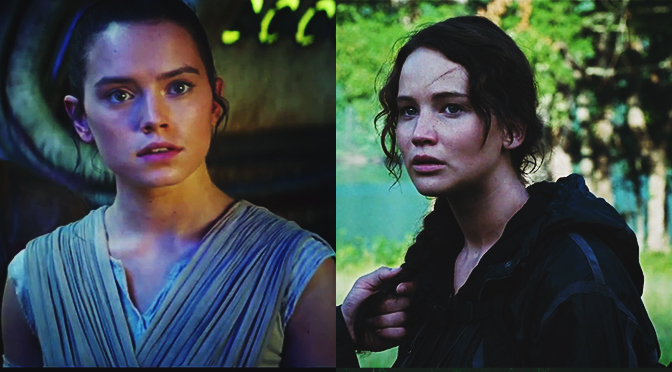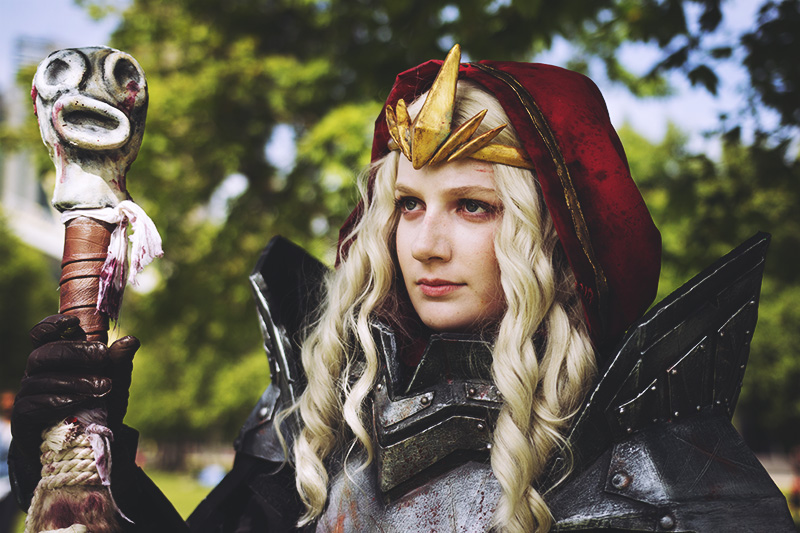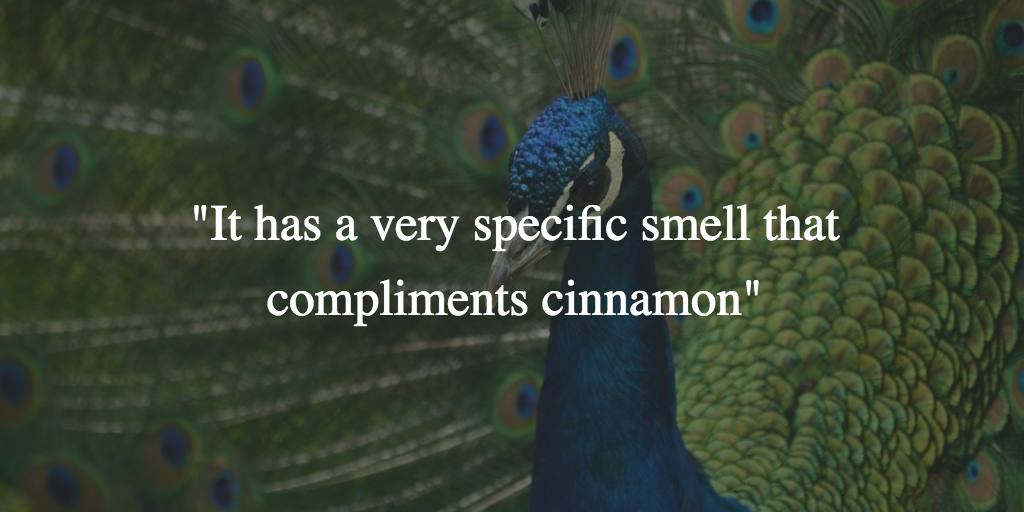
Of Bows and Sabers, and the Girls who Wield them
2015 was a year of great cinema, that’s without a doubt, but the best part? That the two most anticipated of last year—The Force Awakens and Mockingjay Part 2—had something in common other than their sci-fi foundations, something that is still unfortunately new in action and science fiction and big blockbuster films: female leads. Rey, and Katniss Everdeen. Not adults, but girls, both thrown into their respective stories while still teenagers.
Though similar in their survivalist personalities and ability to defend themselves, having learned their fighting abilities simply to survive their harsh lives, both Katniss and Rey have vastly different personalities. Maybe it’s the traits that parallel the two that make them work so well as leads, and their differences that create such compelling young women as they fight for their lives, and the lives of those close to them.
Despite both being very similar in a lot of ways, they are also realistic in that they are two completely different people. Rey shines with her positive virtues: her hope, her kindness. She is endearing and wide-eyed, a girl who befriends Finn and BB-8 so quickly she seems to have known them for years.
Still, she’s an unwilling hero who fights against her destiny for as long as she can. She likely struggles with trust and abandonment. She shines despite her issues, or perhaps—in part—because of them.
Katniss is known for traits typically not seen as positive: she is selfish, blunt, and short-tempered. She is at first unwilling to help the rebellion against the Capitol because she only cares about herself and those closest to her. Friends don’t come easy to her, but she’ll kill for the ones she has.
Her vow to kill President Snow is largely born from vengeance, though the anger also comes from wanting to protect innocent people. She starts off as an unwilling figurehead for a rebellion, and eventually finds herself stepping into the role—even if it means potentially sacrificing herself when everything else has been lost.
Where Rey personifies the warm tones and heat of Jakku, Katniss matches the cool-toned cinematography of much of the films, of the snow used to pack Gale’s whipping wounds. She is afraid, depressed, but strong. She is cool to the majority of the world, looks down on her prep team and the people who live in the Capitol. Her softness is shown to the world in flashes, like flickering snowflakes in the dark. There for one moment, gone the next.
Similarly, Rey’s sincerity is at first hidden. She stares down Unkar Plutt’s unfairness without emotion, she tells BB-8 she won’t let the droid stay with her past morning, and she take Finn out with her staff without a second thought. She’s vicious out of necessity, knowing that Unkar will abuse any weakness—thinking that anyone will, really. She caves at BB-8’s purring when she initially wants to walk away, she chases down Finn because she thinks he stole the jacket from BB-8’s master.
Katniss begins as someone who will walk away; Rey has never been that person.
Fear is what unites the two. Fear and bravery both is what builds them into strong characters. Afraid of her family returning while she’s gone, Rey feels as if she can’t leave the harsh world of Jakku, but there’s the deeper fear: the one that they will never return even if she waits. She’s scared to accept Luke’s lightsaber, instead turning and running to escape the past, and the future. It’s her bravery in the face of Kylo Ren’s anger that gives her the power to save Finn and fight back.
Coming from a world where terror is everywhere, inherent in the act of growing up in the Districts, Katniss lives and breathes fear. She’s scared for her family, scared of the Hunger Games, scared of President Snow and what he could do to those she loves. Every year, the reaping injects fear into the potential tributes and their families.
She only volunteers because it’s her sister that is chosen for the Games—and even that is a rare move in the Districts. Nobody does this, except Katniss. Because she is too scared to live without Prim, and that fear turns into the bravery to volunteer as a tribute.
It is family that motivates Rey and Katniss initially, and it’s family that is the source of their respective fears, which is something that is identifiable to large parts of audiences in different ways. Some people are like Rey, wishing for the family they haven’t had; others are like Katniss, desperate to break through to depressed parents, or protect siblings. They have relatable, real problems beyond a dystopian capitalist system, or a giant, system killing planet, which is part of why so many people identify with them.
As for other parallels between the two, Rey and Finn seem to have a similar dynamic to Katniss and Peeta; not in the eventual-lovers kind of way, but in the way that Katniss says in the Mockingjay novel: “Because that’s what you and I do. Protect each other.”
From the moment Finn runs to Rey as she fights off Unkar’s thugs, the moment Rey looks at him with a total openness when she thinks he’s a Resistance fighter, they form a bond that means they will fight the world for the other.
Whether platonic or romantic, it doesn’t matter. Finn is the first person to come back for her after a life of waiting. She, like Katniss, doesn’t need a guy to come rescue her, but hugely benefits from having a friend who cares so much for her, because that’s how humans are.
People generally can’t live in a vacuum of no affection, and the supposed idea of the Strong Female Character who does exactly that is both unrealistic and, frankly, offensive.
Rey and Katniss are like other young girls—and young people in general—because they need a support group. They are emotional, they are struggling, and being alone doesn’t help that.
Katniss drags Peeta through the first Games and, eventually, the Capitol in the midst of a war. Rey escapes Kylo’s grasp and makes her own way through the base without Finn, and is also the one to take Kylo down. They are not weak because of the boys in their lives, their worth is not defined by the male characters who co-lead the films.
There’s the idea that women and girls can’t carry a story, that movies starring them just straight-up won’t be as good as those that star men. This is clearly, obviously wrong. Fury Road is another example, a film that ended up being much more about Furiosa and the strength of women than it was about Max. Ex Machina, too, which ended up being about women’s agency.
There’s more than enough proof by this point that people like characters such as Katniss and Rey, two almost-adults who are so similar, and yet so different. They personify the struggles of real young girls coming of age, though exaggerated. They show us that you can be a good person even when you’re scared, or angry, or selfish.
They are heroic and strong, while still having real moments of weakness. These are the kinds of characters we need, of all genders, in all stories. They don’t have to be young, don’t have to be men, don’t have to be white, or straight, or even cis.
Katniss and Rey are just both such amazing characters, who so many people can and do look up to. Nobody has to be Force-sensitive or forced into death tournaments to identify with either character, because there are facets of them that, like the shards of a broken mirror, will show bits and pieces of anyone who really looks.
They are—hopefully—the first wave of a generational shift in the way we tell stories, ones where women can lead just as well as men, and be just as nuanced and compelling, if not more so. It is my honest hope that more people will see how amazing they are, burning like flames within their stories, and we’ll start to see more original and interesting female characters leading films in the years to come.
Like my writing? Consider supporting me on Patreon!



